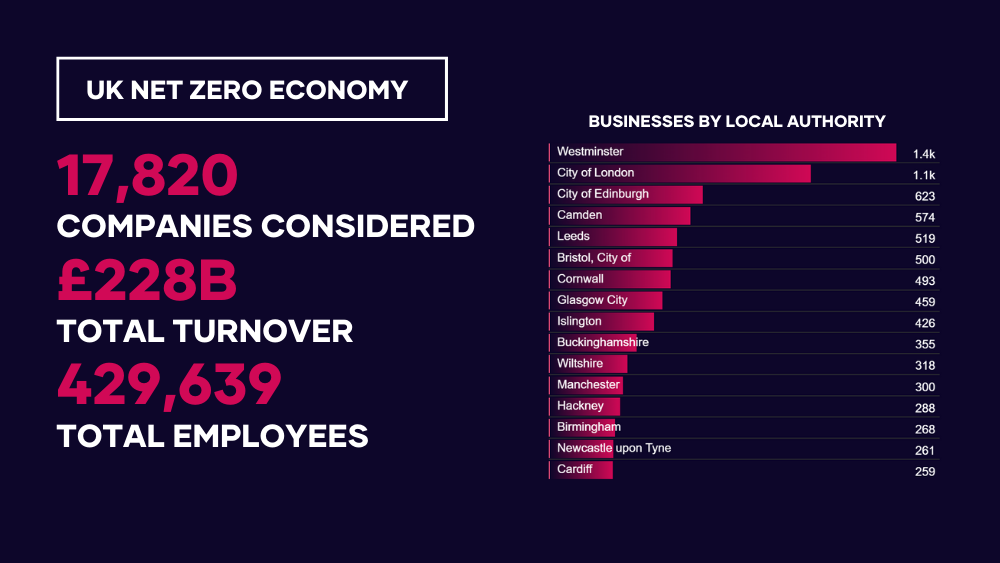With the announcement of the government’s ‘Mini-Budget’ we look closer look at the UK’s new ‘Investment Zones’ – what they are, what they mean for the ‘leveling up’ agenda and how The Data City can help to answer these questions.
The ‘Mini Budget’
With the appointment of Liz Truss as Prime Minister on the 6th of September, we’ve already seen several changes in policy and government. Most notably, on 23rd we saw Chancellor of the Exchequer, Kwasi Kwarteng, publish the Government’s ‘Mini-Budget’ – a new plan which looks to tackle energy costs and drive economic growth.
As part of this, one key element which has brought about a lot of attention, is the introduction of new ‘Investment Zones’ – designated areas of the UK which will see lower taxes and planning frameworks to encourage rapid development and growth.
But just what are ‘Investment Zones’ and how might they work in the future? Where will they be set up and what challenges and opportunities will local authorities face?
What are ‘Investment Zones’?
As discussed by the Chancellor, ‘Investment Zones’ are a key part of the Government’s plan to drive growth by bringing business investment and new housing across areas of the country by lowering taxes and introducing accelerated development and wider support.
The Government have committed to working with local authorities and devolved administrations across England, Scotland, Wales and Northern Ireland as part of the process. Whilst these zones haven’t been confirmed, the Government’s plans identify 38 Mayoral Combined Authorities (MCAs) and Upper Tier Local Authorities (UTLAs) in England who could potentially set up zones. They have also already named 24 locations that could be eligible including sites in Coventry, Sunderland and the East.
The full selection criteria for ‘Investment Zones’ will be set out sooner rather than later by the Secretary of State for the Department for Levelling Up, Housing and Communities. But what’s clear now is that local leaders, partners, authorities and administrations will be integral in delivering these.

How will ‘Investment Zones’ work?
Essentially, ‘Investment Zones’ will act as Freeports, where lower planning standards for housing, stamp duty relief and lower taxes for businesses (and residents) in certain areas could encourage high growth and transformation in parts of the country.
The full announcement from the Government detailed three key benefits for ‘Investment Zones’:
-
Lower taxes
Businesses in designated sites will benefit from time-limited tax benefits.
-
Accelerated development
- There will be designated development sites to both release more land for housing and commercial development, and to support accelerated development.
- The need for planning applications will be minimised and where planning applications remain necessary, they will be radically streamlined.
- Development sites may be co-located with, or separate to, tax sites, depending on what makes most sense for the local economy
-
Wider support for local growth
Subject to demonstrating readiness, Mayoral Combined Authorities hosting Investment Zones will receive a single local growth settlement in the next Spending Review period.
These key incentives have been outlined to help grow the UK economy, supporting growth and jobs. But there’s still a lot we simply don’t know about ‘Investment Zones’. How can local authorities take full advantage of ‘Investment Zones’? What does it mean for the ‘Levelling Up’ agenda? Will ‘Investment Zones’ will simply move growth around the country?
What does this mean?
It seems clear that whilst we’ll still be talking about the ‘Leveling Up’ agenda for years to come, the meaning is already changing – shifting more to a process centered around deregulation.
For now, it looks like ‘Investment Zones’ in will be replacing ‘Levelling Up’ and will be an integral part of the local and national economy. They look to present several opportunities and potential challenges to the UK, whether that be the location boundaries of zones, the time-limit on tax benefits, the opportunities for certain industries and sectors and the halo effect of job growth and the local economy.
How can The Data City help?
The Net Zero Investment Zone?
There is an opportunity to look beyond traditional sectors defined by SIC codes and focus these ‘Investment Zones’ on the key opportunities for growth such as Net Zero. Being able to present central government with a clear idea of where a region’s growth opportunities lie within new and emerging industries like Net Zero will be key to winning support and ensuring success.

Each geography has different opportunities, which is why working with the CBI we have created a Net Zero score card for every local authority in the UK .
Find and support your emerging economy
Once the zones are announced, The Data City will be able to map these local economies for you, using our 340 Emerging Economy sector classifications. Using Real-Time data, we’ll be able to help partners and local authorities answer these key questions and track the true opportunities, challenges and potential impact of ‘Investment Zones’.
There’s a wealth of opportunity here, with The Data City able to classify companies within investment sites. From our data we’ll be able to understand the volume of businesses, number of employees, turnover, investment, company size, job types, growth and importantly the sectors and verticals within them.
So, what’s next?
There are still a lot of unknowns when it comes to the implementation of ‘Investment Zones’ in the UK, with currently no costings outlined in the Growth Plan, so we will have to wait to find out more detail – particularly on what further criteria will be shared with MCAs and UTLAs.
At any rate it means a lot in terms of our growing economy and will continue to shape growth for years to come.
Whilst we can’t directly answer some of the questions ourselves, we can help you approach ‘Investment Zones’ and the mapping of the emerging economies in local authorities and beyond.
What questions does this raise for you? Do you need help to consider which sites will drive a substantial contribution to the UK’s economic growth and acceleration in housing?
If you want to talk to us more about the future of ‘Levelling Up’ and the next steps from the ‘Mini-Budget’, we want to hear from you. Simply contact us today and we’ll be in touch.


